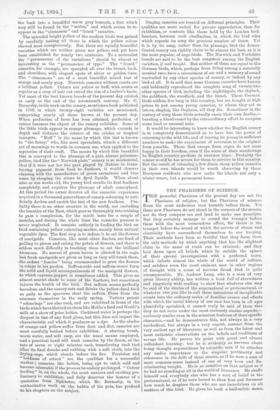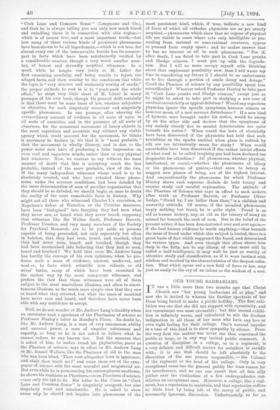THE PHARISEES OF SCIENCE. T HE powerful Pharisees of the present
day are not the Pharisees of religion, but the Pharisees of science. Even the most audacious men tremble before them. Yet these new Pharisees do not stand in the corners of the streets, nor do they compass sea and land to make one proselyte. But they certainly manage to sound the trumpet before them with the most tremendous effect, for theirs is the trumpet before the sound of which the secrets of steam and electricity have surrendered themselves to our keeping. Their methods have been so fruitful that they deem them the only methods by which anything that has the slightest claim to the name of truth can be attained ; and they look down upon all beliefs which lie outside the sphere of their special investigations with a profound scorn, which infects almost the whole of the world of culture, and subdues even the most eminent men in other regions of thought with a sense of nervous dread that is quite unconquerable. Mr. Andrew Lang, who is a man of very great literary ability, has written a book full of shrewdness and singularly wide reading to show that whatever else may be said of the stories of the supernatural or preternatural, or whatever else you like to call those intrusions of inexplicable events into the ordinary series of familiar causes and effects with which the social history of our race has been in all ages plentifully sprinkled, it cannot truly be said of them that they do not recur under the most curiously similar aspects,— curiously similar even in the minutest features of their specific character,—and he demonstrates this, not always in a very methodical, but always in a very cogent, manner from the very earliest age of literature, as well as from the latest and most authentic observations on the beliefs and traditions of savage life. He proves his point with great and almost redundant learning ; but he is evidently as nervous about being thought superstitious by scientific men if he attaches any undue importance to the singular pertinacity and coherence in the drift of these stories, as if he were a man of mere common-sense instead of one of very keen and dis- criminating insight. He is as sensitive on that subject as if he had no standing at all in the world of literature. He ehaffa himself and everybody else who has a sort of belief in the preternatural, as if he were bound to show first and foremost how much he despises those who are not incredulous on all matters of this kind. He gives his book a half-satiric name, "Cock Lane and Common Sense" (Longmans and Co.), and then he is always telling you not only how much fraud and swindling there is in connection with this region,— which is of course true, and a most important truth,—but how many of these various kinds of persistent phenomena have been shown to be all legerdemain,—which is not true, for almost every one of the innumerable frauds has its counter- part in facts which have been satisfactorily verified by a considerable number, though a very much smaller num- ber, of honest and shrewdly sceptical witnesses. In a word, while he laughs very justly at M. Littre for first examining carefully, and being unable to feject, the alleged facts, and then coming to the conclusion that while the topic is "very obscure and eminently worthy of study," the proper attitude to rest in is to "pooh-pooh the whole affair," he stops very little short of M. Lithe in many passages of his own book, though his general drift certainly is that there must be some basis of law, whether subjective or objective, for such singularly recurrent and singularly specific phenomena. In one passage, after showing the extraordinary amount of evidence in all sorts of ages, in all sorts of countries, and in the presence of all sorts of observers, for the occasional movement of heavy objects in the most capricious and eccentric way without any visible agency which could account for the movement, he thinks it necessary to declare (p. 60) that it is "most probable" that the movement is wholly illusory, and is due to the power some men have of producing a false impression on even cool and sagacious minds, rather than to any physical fact whatever. Now, we venture to say without the least manner of doubt that this is accepting much the leas probable, instead of the more probable, view of the two. If the many independent witnesses whose word is to be absolutely trusted, and who have attested these pheno- mena under the severest conditions, had been deluded by the mere determination of men of peculiar organisation that they should be so deluded, we should begin at once to doubt the reality of the most remarkable facts in history. Why might not all those who witnessed Charles L's execution, or Napoleon's defeat at Waterloo, or the Peterloo massacre, have been "biologised" into fancying they had seen what they never saw, or heard what they never heard, supposing that witnesses like Sir Walter Scott, Professor Barrett, Professor Crookes, and very many members of the Society for Psychical Research, are to be put aside as persons capable of being persuaded, not only separately but often in batches, that they had seen, heard, and touched, what they had never seen, heard, and touched, though they had been mesmerised into believing that they had so seen, heard and touched ? We hold that even Mr. Andrew Lang has hardly the courage of his own opinions, when he pro- duces such a mass of evidence, ancient, mediwval, and modan, to facts which scientific men ridicule as old wives' fables, many of which have been examined in the coolest way by the most competent witnesses, and prefers the view that those witnesses were all of them subject to the most marvellous illusions, and often to simul- taneous illusions, to the much more simple view that they saw or heard what they attested, but what the mass of mankind have never seen and heard, and therefore have never been able with any confidence to accept.
Well, we do not wonder at Mr. Andrew Lang's timidity when we encounter such a specimen of the Pharisaism of science as Professor Huxley's letter in Monday's Times. No doubt he, like Mr. Andrew Lang, is a man of very uncommon ability and unusual power, a man of singular astuteness and sagacity, so long as he is not asked to believe what he cannot reduce to any known law. But the moment that is asked of him, he makes broad his phylacteries, poses as the Pharisee of science, says in effect to Mr. Andrew Lang or Mr. Russel Wallace, like the Pharisees of old to the man who was born blind, 'Thou wast altogether born in ignorance, and shalt thou teach me ? ' and casts them out of the syna- gogue of science with the most scornful and magisterial air. But even while he is pronouncing his contemptuous anathema, he shows his weakness as Pharisees,—even Pharisees of science, —are only too apt to do. His letter to the Times on "Cook Lane and Common Sense" is singularly arrogant, but also singularly weak and unscientific. He is asked to show cause why he should not inquire into phenomena of the most persistent kind, which, if true, indicate a new kind of force of which all orthodox physicists are as yet utterly sceptical,—phenomena which show that no organs of physical, life are visible in cases where acts only intelligible as pro- ceeding from rational or semi-rational creatures, appear to proceed from empty space ; and he makes answer that he has no interest at all in such phenomena, "For if, after death, I am fated to take part in Cock Lane pranks and Sludge seances, I must put up with the degrada- tion. But I will no more occupy myself with thinking about that unpleasant possibility now, than I will waste my time in considering my future if I should be so unfortunate as to live through a portion of senile decay and dotage." Could the Pharisee of science by any possibility speak less scientifically P Whoever asked Professor Huxley to take part in"Cock Lane pranks and Sludge seances," except just as he might be asked to take part in studying a new case of cerebral eccentricity or typical delirium P Would any sagacious physician ignore the specific symptoms, however minute or however mean, of a new nervous disturbance ? If a new kiwi of hysteria were brought under his notice, would he sweep, by on the other side and declare that the symptoms of any malady clearly due to mental deterioration are quite beneath his notice ? When would the laws of electricity have been discovered if the physicists had held that such. trivialities as the sparks emitted when glass is rubbed by silk are too intrinsically mean for study ? When would, anaesthetics have been discovered if the rather trivial effects of what used to be called laughing-gas had been declared too despicable for attention ? All phenomena, whether physical,. intellectual, or moral,—whether the phenomena of idiocy or the phenomena of genius,—that seem to betray or suggest new planes of being, are of the highest interest. And unquestionably the phenomena for which Professor Huxley shows such supreme disdain do both betray and require study and careful explanation. The attitude of the Pharisee of Science who says in effect to such seekers after truth as Professor Barrett, or Professor Oliver Lodge, "Stand by, I am holier than thou," is a childish and unworthy attitude. Of course, if the so-called phenomena imply nothing but fraud, he is quite right. Fraud is as. old as human history, nay, as old as the history of many an animal far beneath the rank of man. But in the belief of the present writer, it has been demonstrated over and over again,— if the best human evidence be worth anything,—that beneath. the mass of fraud under which this subject is buried, there is a great basis of fact which suggested the fraud, and determined its various types. And even though this often shows how deep is the folly, not to say idiocy, of what must still be called a half-intelligence, it may well be just as worthy of attentive study and classification, as if it were instinct with wisdom and marked by the characteristics of the deepest reflec- tion. That which opens out a new field of force or law, may just as easily be the cry of an infant as the wisdom of a seer.



































 Previous page
Previous page